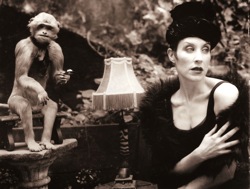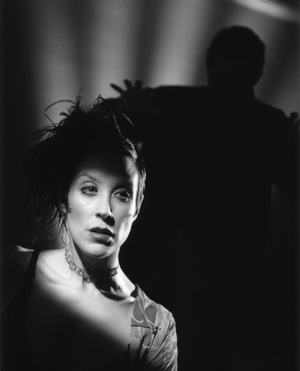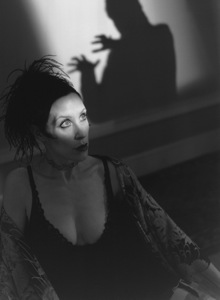Jill Tracy is a singer/songwriter/composer/performer/author (most recently in the new anthology Morbid Curiosity Cures the Blues), above all, storyteller. I’ve been a fan of her work for several years. While I could go on and on about how lush and evocative her music is, I think it’s far better to hear her description.
Jason Henninger: I was reading through older interviews you’ve done, and you often cite The Twilight Zone as an inspiration for your music. Tell me more about that.
Jill Tracy: Rod Serling and The Twilight Zone had a huge effect on me. The tales were disconcerting, yet there was always a message underneath. You learned something. It was smart. It taught me succinct, less-is-more storytelling. Often it was what you didn’t see that really put the fear in you. “Eye of the Beholder,” for example. This woman is presented to be so grotesque, and you don’t see her face until almost the end, nor the faces of the surgeons and nurses trying to help her become less hideous. You’re on the edge of your seat wondering how horrible the woman must really be. And at the end you see she’s a beautiful woman, the doctors are hideous creatures, and you’ve been totally mind-tricked! How fantastic that a story could evoke such emotion and response essentially revealing so little. I abide by that in my approach to music. It’s the breath, the spaces between the notes and the arrangements that make the work come alive. The soul lives in the silence.
The composers—for example Bernard Herrmann who also worked with Alfred Hitchcock—really pushed it to the edge for me, showing that mood can be solely conjured by music. Someone’s at a carnival, and it’s supposed to be happy, but then suddenly the music changes and gives it a sense of dread.
Henninger: I noticed reviewers often compare your music to films or literary works, but you’re not often compared to other musicians. Why do you suppose that is?
Tracy: Wow, I guess you’re right. I love that fact! When I am interviewed no one ever brings up the latest buzz band. It’s always obtuse. They want to discuss everything from Fritz Lang to Scriabin, to the guillotine. I just did an interview with LA Weekly, and much of it was talking about my “art of melancholy” and Jean Cocteau. It’s refreshing. It proves that that my style and work is singular and distinctive. My little kingdom. It stems from my own personal passions. I’m not trying to be anyone but myself.
Henninger: Who are some of your favorite authors?
Tracy: Definitely Ray Bradbury. I would love to compose the score to the carousel in Something Wicked This Way Comes. You grew older as the carousel moved forward, and younger as it spun in reverse. Brilliant. I’m a huge Steven Millhauser fan. His short stories have a strange, wondrous, childlike sensibility.
Henninger: How about Edward Gorey? A lot of reviewers compare you to him.
Tracy: Truthfully, I didn’t find out about Edward Gorey until after I started performing. I had seen his illustrations and the PBS Mystery! show but that was it. After I started performing live, it was through fans that I learned about The Gashleycrumb Tinies and other stories. My song “The Proof” [‘a tale told in six suicides’] on the album Diabolical Streak, was definitely based on Gorey. I wanted to write a song that was an homage to his sweetly sinister nursery-rhyme style. But that’s really the only song inspired by him. The other reason I’m sometimes mentioned in relation to him is The Edwardian Ball, which happens every January in San Francisco in honor of Edward Gorey. It’s been going on about ten years now, and I’ve had the good fortune to be involved. Justin Katz, who is the mastermind behind the whole festival, has called me the “Belle of the Edwardian Ball” and I perform every year.
Henninger: Clive Barker said, “Jill Tracy creates an elegant netherworld that is both seductive and terrifying.” And I was thinking, shit, if Clive Barker said that about me, I’d have multiple egogasms for the rest of my life. How do you react when you hear your work described that way?
 Tracy: It’s a great challenge to live up to that. But, it’s all coming from an authentic place inside of me. I’m quite an island in that way. So, certainly, when accolades come from people I admire and appreciate, it makes me feel like I’ve succeeded. You think, wow, they get it! The very thing I’ve been striving for all along is being recognized.
Tracy: It’s a great challenge to live up to that. But, it’s all coming from an authentic place inside of me. I’m quite an island in that way. So, certainly, when accolades come from people I admire and appreciate, it makes me feel like I’ve succeeded. You think, wow, they get it! The very thing I’ve been striving for all along is being recognized.
It’s been a tough road. I hate when reviewers can’t get beyond “Jill Tracy- she’s sexy and spooky!” There’s a lot more depth and gravity to what I do. But journalists are usually just looking for the fluff.
I had one of those “full circle” moments recently on Halloween when David J [of Bauhaus and Love & Rockets] and I hosted the Ghostly Equestrian Ball in Hollywood. Here I was onstage with the man who not only wrote “Bela Lugosi’s Dead” but also played that legendary bass line, and we are singing a cover together of David Bowie’s “All the Young Dudes,” written for Mott the Hoople! Ahhhh, talk about my goth and glam rock fantasies coming true! I was even wearing a sequin-embellished top hat at the time.
Henninger: Let’s talk about how you became a musician. I read that you don’t write or read music.
Tracy: Very little. Neither Paul Mercer [a violinist who often accompanies her] nor I have much formal training. We share very similar stories. We were each obsessed with composing our own music and were told “you don’t do that, you have to learn pieces by the masters.” Feeling confined led us to quit taking lessons and venture off on our own.
I am an only child and always felt out of sorts with the world. I was looking for a grand escape. I attempted to build a time machine in my bedroom closet—with my favorite books, a little lamp, and pens and paper. I would shut the door and think, ok, I am going to open the door now and it’s all going to be different. It didn’t happen! So I had to find another way to get there. The portal came through music. When I was a kid, I would watch TV with the volume down and make up my own music. We had an organ in the house. My neighbor was an elderly widow and she had a strange house full of bric-a-brac, statues and dolls. She had an ornate golden piano in her basement—that kept watch next to the washer and dryer—and I’d hide out there and play. When I’d sit at the piano, all of a sudden everything would make sense, I could create sounds and moods that would transport me. I had no idea what notes I was playing; it was all intuited. The basis for everything was to create another world where I could escape the confines of the every day.
As a teenager, I wanted to sing in a rock band. I never wanted to play piano or write these dark, elegant songs. But I kept going back to film composers for inspiration, German expressionist films and film noir. The mood was so evocative to me I felt as though my whole purpose was to invoke that feeling through my work. I couldn’t deny it. I just wasn’t satisfied doing “popular” styles of music. It’s been both my blessing and my curse.
Henninger: So, in a way, when you turned down the sound on the TV and composed, you’d started writing film scores. And then, in 1999, you composed “Into the Land of Phantoms,” a score to F.W. Murnau’s Nosferatu. How did that come around?
Tracy: Nosferatu exemplifies that ideal imagery. It’s dark, but very alluring—the unnatural and natural together. I didn’t find Count Orlock to be evil or scary so much as he was sensual. I had never been impressed with any score I’d heard for Nosferatu. I’d hear irritating piano scores or incongruous electronic rock scores that swallowed up everything on the screen. I felt it was an insult to the film.
As I wrote the music—piano, cello, violin, percussion—I realized how lovely and musical the film itself is, and I wrote a score that would simply bring Murnau’s visuals to life. I’m very proud of it. Philip Brandes [of the Los Angeles Times] called it the “definitive score to Nosferatu.” The CD Into the Land of Phantoms contains selected pieces from the score.
I just received an email from the Anne Rice Society telling me they played “Into the Land of Phantoms” ongoing all night during her legendary New Orleans Ball as guests mingled about. I was fortunate to perform live at Anne Rice’s Ball last year.
Henninger: I’ve seen you perform live many times, and you always have a great rapport with the audience. What do you, as a performer, seek to give them?
Tracy: I feel that I need to be a beacon for people, and allow them into the swampy place in their souls where the sinister and sensual meet. People are afraid to peel away the layers of comfort and convention that we hide behind. I find it fascinating to delve into those places and take an audience with me.
We did a series of shows called The Musical Séance. We’d ask audience members to bring in a cherished heirloom, or something of special significance to them. A photo, a piece of jewelry, that sort of thing. They’d bring it to the stage and we’d use that object to channel the music. Really powerful. I have learned to channel music spontaneously via various energy sources, whether found objects, environments, etc. It’s a completely opposite experience from playing a concert of songs.
Henninger: Sort of musical psychometry.
Tracy: Exactly. The Musical Séance was exhausting at times. Night after night it was totally different. It was all about what the audience would bring to me. Some nights were light-hearted and the music was warm. Some nights were heavy, heavy sadness. People would say, “This is a ring from my uncle who committed suicide.” And I would put on the ring and begin to play the piano. I felt the energy and would present it musically. One particular night became so intense I was on the verge of fainting. Almost stopped the show.
People wanted a catharsis, or musical therapy, and out of respect for them, we had to provide that. We were not claiming we could talk to their dead, but people were coming to the show with a need to be met.
We all want to believe in magic. It keeps hope alive. Sometimes I feel that magic and the suspension of disbelief is the only thing that matters. I think that’s why my music resonates with people on such a deep level.
I was given the book The Mysterious World when I was a child and when I first opened it, there was a picture of spontaneous human combustion. I had never heard of such a thing in my life. There’s that wonderful old photograph of Dr. John Irving Bentley who suddenly burst into flame. There’s a bit of his leg, with his foot still in a slipper, his walker, and cinders everywhere. And I’d read about toads and frogs and blood raining from the sky. Or Count Saint Germain, who was recorded to have lived for hundreds of years. He said his secret to immortality was to eat oatmeal and wear velvet encrusted with gemstones. To this day, no one knows exactly who he was, where he came from and if indeed he was immortal.
Unfortunately, these days of internet and technology have murdered “the legend.” That breaks my heart. Monsters, marvels, lore, and legend—these are the things that make us feel most alive. The most wonderful questions of all are the ones for which there are no answers. One of my favorite quotes is, “In the end, it is the mystery that prevails, never the explanation.” Sadly, the world has gotten to a point where everybody’s demanding an explanation. But after the info, they’re still bored and unfulfilled.
I think it’s my purpose to perpetuate the long-lost magic, allow people to slip into the cracks, to pry up the floorboards and search deeply. Believe. Imagine. It’s so important to hold on to that childlike sense of marvel.
Jill Tracy Discography:
Quintessentially Unreal
Diabolical Streak
Into the Land of Phantoms
The Bittersweet Constrain
Follow Jill Tracy on Twitter:
Jill Tracy on MySpace
When Jason Henninger isn’t reading, writing, juggling, cooking, raising evil genii or wishing Clive Barker would say nice things about him, he works for Living Buddhism magazine in Santa Monica, CA










